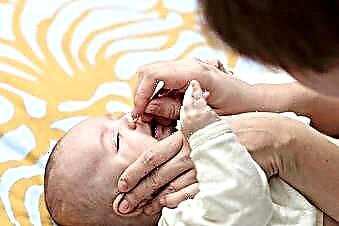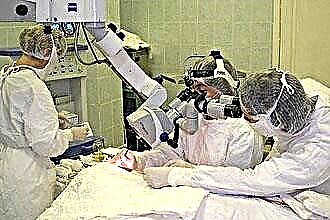 Hypertrophy of the lingual tonsil occurs due to the need to constantly keep the body's defenses.
Hypertrophy of the lingual tonsil occurs due to the need to constantly keep the body's defenses.
Normally, the tonsils can increase in the acute phase of an infectious disease, however, after defeating the microbes, the lymphoid tissue regains its former size.
The lingual tonsil hypertrophies in parallel with other lymphoid formations, since they are in direct contact and perform a protective function.
Causes of hypertrophy
Changes in the structure of the amygdala can occur in several ways:
- vascular-glandular, which is observed in the case of local changes in the form of proliferation and plethora of blood vessels, while the volume of tissue decreases;
- lymphoid, when lymphoid hyperplasia occurs due to prolonged inflammation and the presence of infectious intoxication.
An increase in lymphoid formation occurs for the following reasons:
- chronic inflammation of the tonsils (pharyngeal or palatine) - with adenoids and tonsillitis, when microbes remain in the folds of the mucous membrane and support inflammation;
- inflammation of the lingual tonsil (glossitis) when it is injured;
- burdened heredity. If the parents had adenoids or tonsils were removed, the child may also have problems with the tonsils;
- negative effect of dry, dusty air, industrial hazards;
- smoking;
- oncological diseases of the pharynx;
- undergone surgery to remove adenoids or tonsils, when the remaining tonsils take over the function of the removed lymphoid formations, which leads to their hyperplasia;
- professional harm when the voice-forming apparatus has a heavy load (singers, orators, announcers).
In children, pathology is extremely rare, but for mature men and women in the premenopausal period, hypertrophy of the lingual tonsil is not uncommon. Most cases occur during puberty.
Disease manifestations
It is possible to suspect the proliferation of lymphoid tissue in the region of the tongue on the basis of the following clinical signs:
- discomfort when swallowing;
- the presence of a foreign element;
- a sudden attack of dry cough;
- slight hyperemia of the throat;
- hoarseness of voice;
- nasalness;
- apnea, which is fraught with hypoxia due to insufficient oxygen supply to the internal organs;
- heavy snoring at night;
If the amygdala is greatly enlarged, it can be seen, although it is not normally visible.
Apnea is a serious complication of the disease that requires medical attention.
Diagnostic procedures
It is difficult to independently diagnose hypertrophy of the lingual tonsil, since the symptoms are nonspecific and may indicate a different pathology. Having consulted a doctor, the diagnosis begins with a survey of complaints that bother a person, and the peculiarities of their appearance. Next, the doctor examines the history of life, finding out what the patient was sick and sick with.
To examine the oral cavity, pharyngoscopy and laryngoscopy are performed, according to the result of which it is possible to establish the degree of proliferation of lymphoid tissue and assess the defeat of the glands. In addition, the tongue is examined, or rather its root, where the amygdala is located.
To diagnose between infectious disease and non-inflammatory hypertrophy, throat swabs are taken and examined by microscopy or culture.
Hypertrophy of the lingual tonsil should be different from:
- an inflammatory process in the root zone of the tongue, which can be expressed in the form of an abscess, phlegmon, or develop as a result of tuberculosis, syphilis or
 candidiasis. On examination, films with a dense structure are revealed. For differences, a bacteriological analysis is carried out;
candidiasis. On examination, films with a dense structure are revealed. For differences, a bacteriological analysis is carried out; - cystic formations of the oral cavity are characterized by clear outlines, smooth surface and tense consistency;
- benign tumors (adenoma) - are distinguished by a dense structure with a smooth surface;
- malignant neoplasms, which can be distinguished by a tuberous surface, stony density and compaction of regional lymph nodes. A biopsy is used for diagnosis.
Treatment directions
The medical tactics are determined by the doctor based on the results of instrumental and laboratory diagnostics.
The task of diagnostics is not only to confirm the diagnosis, but also to identify the cause of the disease. Treatment is also aimed at eliminating the cause and reducing the severity of clinical symptoms.
If the cause of lymphoid hypertrophy is chronic inflammation or infection, it is advisable to prescribe:
- anti-inflammatory therapy of local action (gargling with Givalex, Chlorfillipt, irrigation of the tonsils - Tantum Verde, Jocks);
- antibacterial agents of systemic or local action (Augmentin, Bioparox spray, Miramistin in the form of a solution);
- antifungal drugs (Fluconazole, Intraconazole, Ketoconazole);
- antihistamines (Suprastin, Claritin, Tavegil).
Antibacterial drugs are prescribed taking into account the results of the antibioticogram during bacterial culture.
The patient needs to be patient a little and limit his diet from spicy, hot, solid foods and pickles. In addition, you need to take time to relax, avoid stress, go to the sauna and reduce physical activity. Do not forget about increasing immunity, hardening, vitamin therapy and walking in the fresh air.
To help traditional treatment, you can use folk recipes. Decoctions of herbs (chamomile, oak bark, calendula) and essential oils can also be used to rinse the oropharynx and inhale.
If there is no effect of conservative therapy, the doctor decides on a surgical procedure. Surgery to remove a tonsil is rarely performed. In the postoperative period, bleeding and a temporary decrease in immune defense are possible. Removal can be done by coagulation or cryofreezing. The procedures are repeated several times, in the end you can achieve a good result.
Prophylaxis
Despite modern approaches to treatment, which allow achieving a positive effect, it is still better for the body not to get sick at all. To do this, you need to follow simple recommendations:
- temper children from an early age;
- treat chronic diseases on time;
- regularly visit the dentist, sanitize foci of infection in the oral cavity;
- have a good rest;
- avoid stress, heavy physical activity;
- take vitamins;
- perform morning exercises, sports activities.
The child should sleep in a clean, ventilated room. It is not allowed to live in a room with dry dusty air, especially in the presence of mold. Even in winter, airing is required, but not a draft!
It is easiest to strengthen the immune system on a seaside vacation. The sun's rays, healthy food and water treatments not only strengthen the immune system, but also improve the mood of children and parents.

 candidiasis. On examination, films with a dense structure are revealed. For differences, a bacteriological analysis is carried out;
candidiasis. On examination, films with a dense structure are revealed. For differences, a bacteriological analysis is carried out;

